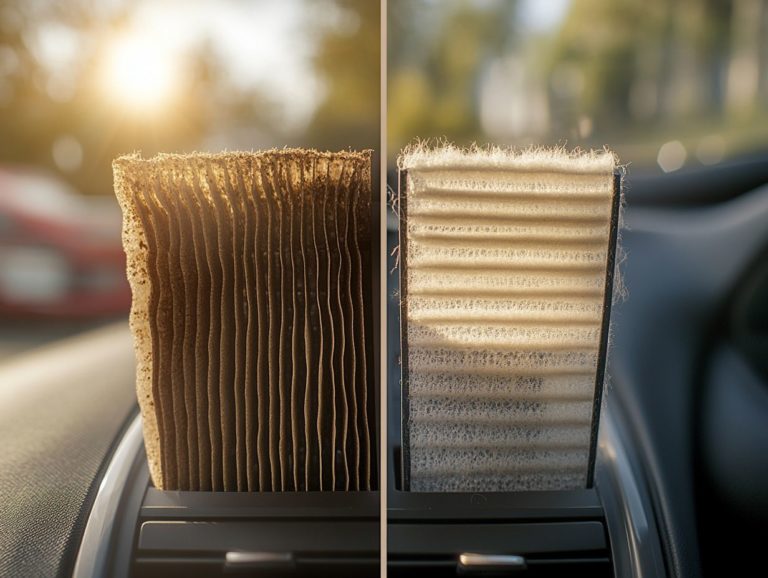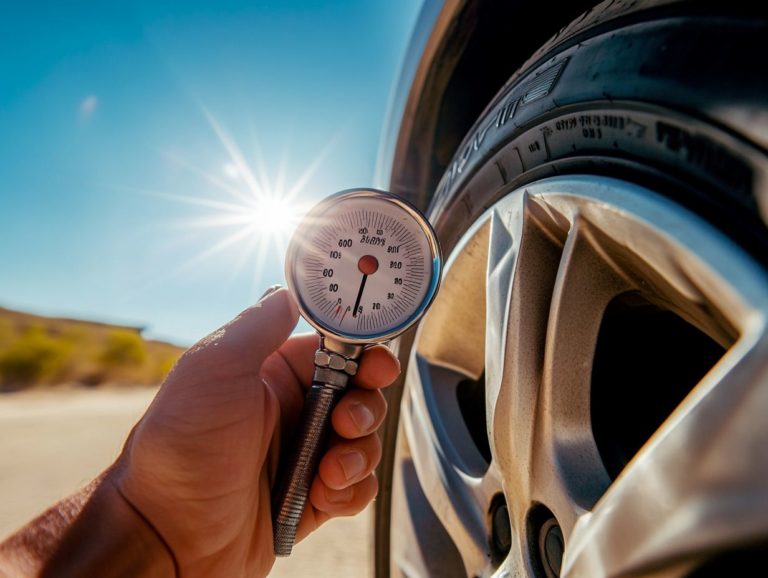The Role of Preventive Maintenance in Car Care
Preventive maintenance is a crucial part of car care that often slips under the radar. Don t wait until it s too late start your preventive maintenance today!
Let s dive into the exciting world of preventive maintenance and discover why it s vital for your vehicle. By grasping the key benefits of regular upkeep and recognizing common maintenance tasks such as oil changes and tire rotations you ll be equipped to create a maintenance schedule that perfectly suits your needs.
You ll also discover cost-saving tips to keep your vehicle running smoothly without straining your wallet. Proactive care can elevate your driving experience to new heights.
Contents
- Key Takeaways:
- Understanding Preventive Maintenance
- The Benefits of Regular Maintenance
- Common Preventive Maintenance Tasks
- Creating a Preventive Maintenance Schedule
- Cost-Saving Tips for Preventive Maintenance
- Frequently Asked Questions
- What is the role of preventive maintenance in car care?
- What are some common preventive maintenance tasks for cars?
- How often should preventive maintenance be performed on a car?
- What are the benefits of regular preventive maintenance for cars?
- Can I perform preventive maintenance on my car myself?
- Is preventive maintenance necessary for new cars?
Key Takeaways:
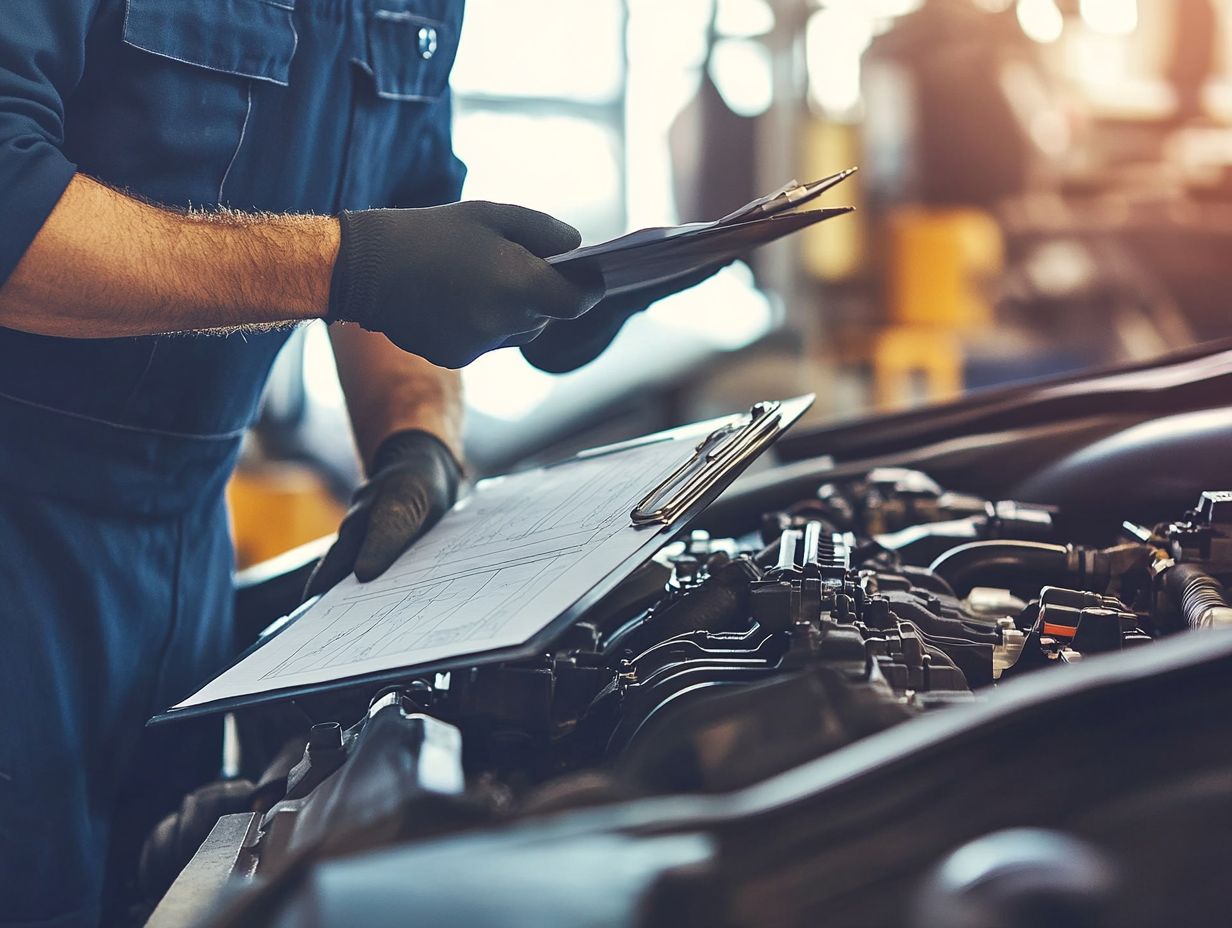
- Regular preventive maintenance keeps your car safe and running well, saving you from unexpected breakdowns and costly repairs.
- Tasks like oil changes and tire rotations help your car last longer and save you money in the long run.
- A well-planned maintenance schedule, considering mileage and manufacturer recommendations, helps you stay on top of tasks and saves money.
Understanding Preventive Maintenance
Preventive maintenance is crucial for ensuring your vehicle’s longevity and optimal performance. This enables you to enjoy a smoother driving experience while reducing the chances of unexpected breakdowns.
This proactive strategy involves regular checks and services that can significantly boost engine reliability and overall vehicle health. By collaborating with certified mechanics, you can craft a comprehensive maintenance schedule tailored to your vehicle’s unique needs.
Understanding preventive maintenance extends your vehicle’s life and improves safety, allowing you to feel confident and secure on the road.
Definition and Importance
Preventive maintenance is all about giving your vehicle the routine and systematic care it deserves. This ensures that significant issues don t creep up and compromise safety and performance.
This strategy includes essential tasks like regular oil changes, tire rotations, and brake inspections. By sticking to a consistent maintenance schedule, you significantly enhance your vehicle’s safety. This practice helps minimize the chances of sudden breakdowns or accidents stemming from mechanical failures.
When you take the time to regularly check and replace worn components, you ll notice an improvement in overall vehicle performance. Your ride will be smoother, and you ll also benefit from better fuel efficiency. As a result, you may find that your repair costs decrease over time since those small issues are identified and tackled before they become major repair bills.
The Benefits of Regular Maintenance
Regular maintenance serves as the foundation of preventive practices, offering a wealth of benefits that significantly enhance your vehicle’s longevity and ensure it performs at its best.
By committing to this routine, you effectively minimize the risk of unexpected breakdowns, allowing you to enjoy the road with peace of mind.
Improved Performance and Safety
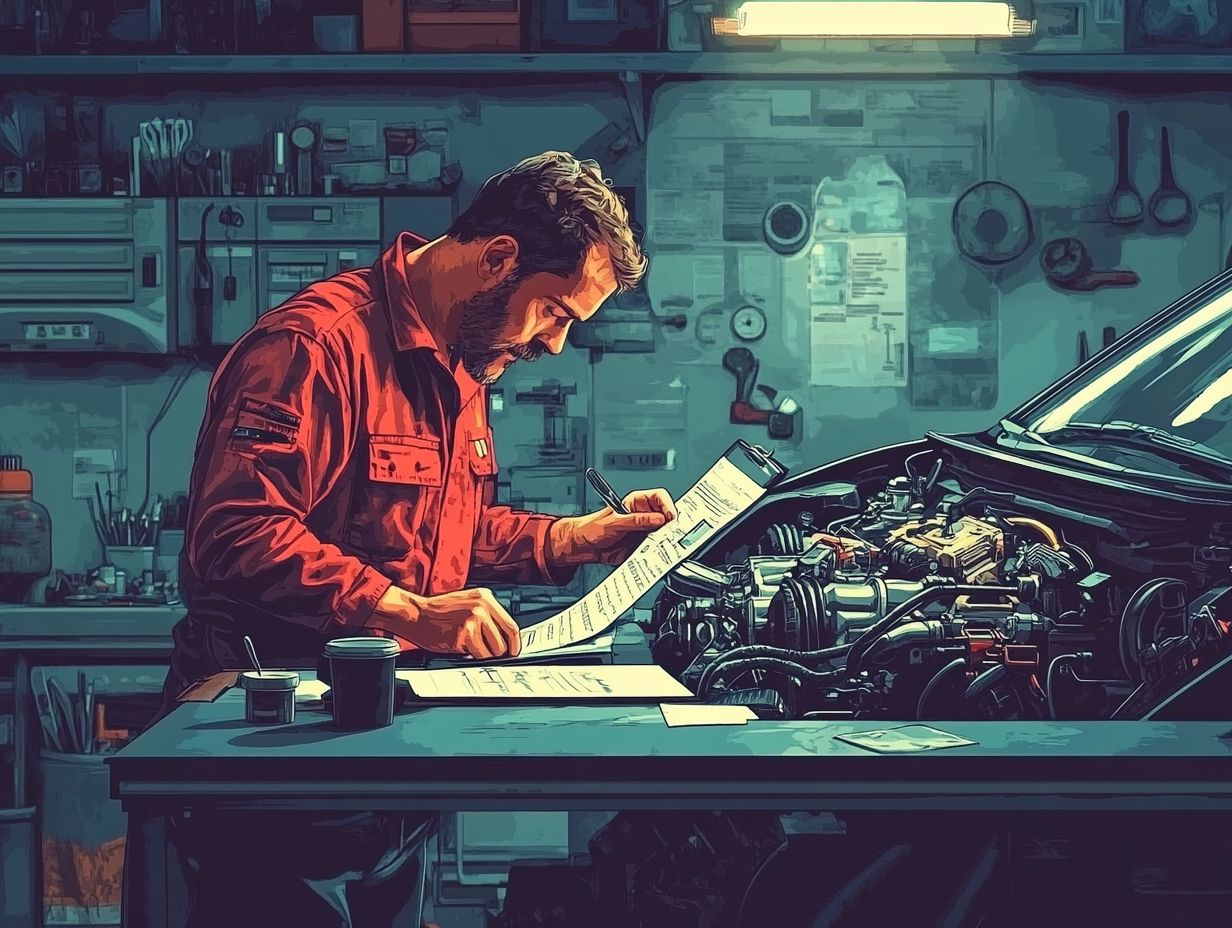
Improved performance and safety in your vehicle are intrinsically linked to regular maintenance checks that ensure every component operates at its best.
When you prioritize consistent maintenance, you not only extend the lifespan of your vehicle but also enhance its overall engine reliability. A well-maintained engine runs smoothly and efficiently, leading to superior fuel economy and significantly reducing the chances of unexpected breakdowns. Routine inspections of critical systems, like brakes and tires, markedly enhance safety features.
Keeping an eye on fluid levels such as coolant, oil, and brakes helps maintain your vehicle’s integrity while minimizing the risk of malfunctions. In essence, taking a proactive approach to vehicle upkeep translates into a dependable driving experience that enhances both performance and safety.
Common Preventive Maintenance Tasks
Common preventive maintenance tasks include oil changes, tire rotations, brake inspections, and fluid checks. Each plays a vital role in ensuring your vehicle operates smoothly and efficiently.
Oil Changes, Tire Rotations, and More
Oil changes, tire rotations, and brake inspections should be prioritized to keep your vehicle functional and safe.
These tasks keep your vehicle happy and on the road longer! It s generally recommended to change your oil every 3,000 to 5,000 miles using high-quality engine oil for proper lubrication and fuel efficiency.
Tire rotations every 6,000 to 8,000 miles promote even tire wear and maximize grip. Routine brake inspections every six months can help prevent unexpected failures.
By committing to these practices, you greatly enhance your vehicle s performance and contribute to road safety, keeping you and your passengers protected.
Creating a Preventive Maintenance Schedule
Establishing a preventive maintenance schedule is essential to ensure that all necessary tasks are completed promptly. This proactive approach enhances vehicle performance and significantly extends its longevity.
Factors to Consider and Tips for Sticking to a Schedule
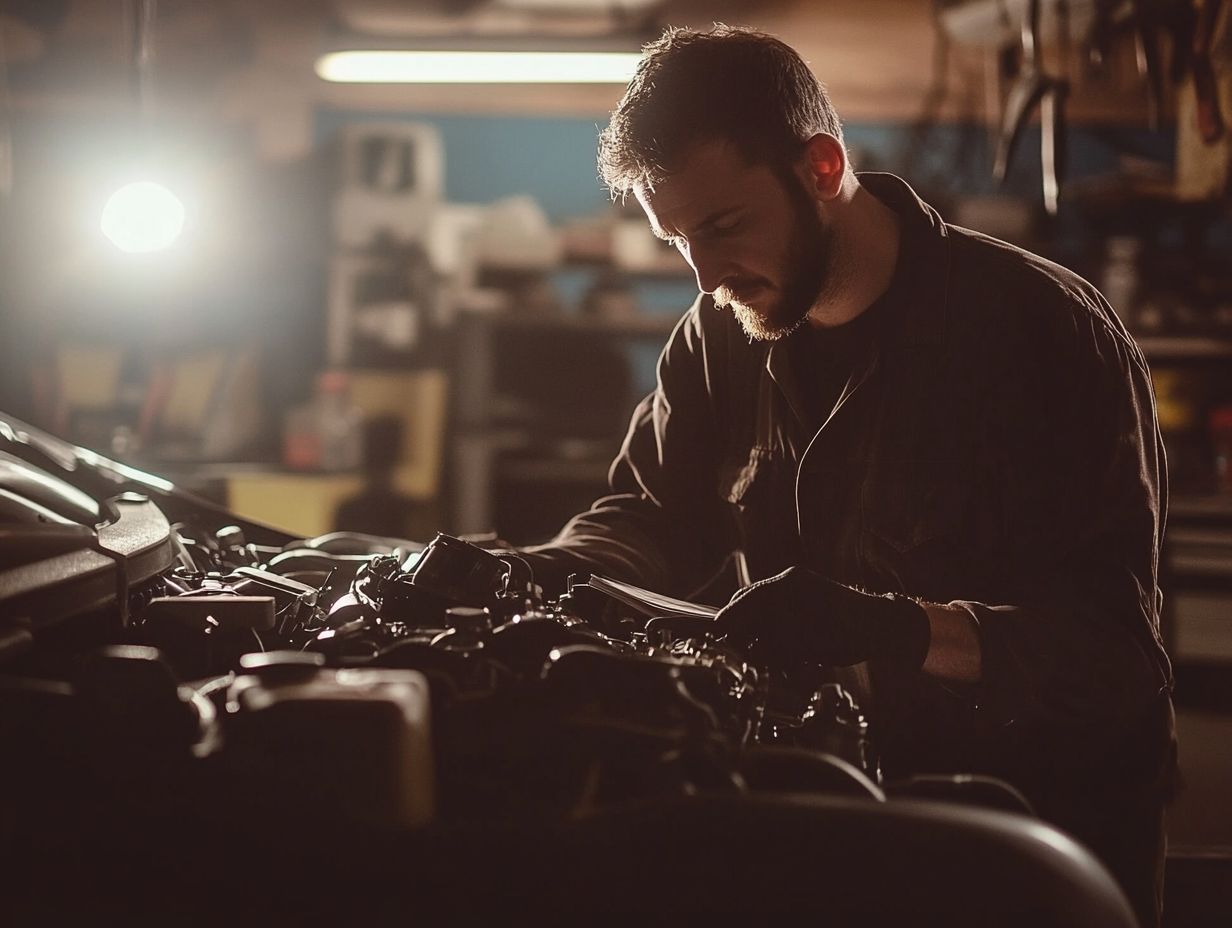
When creating your maintenance schedule, consider factors like your driving habits, your vehicle s history, and local environmental conditions. This ensures your vehicle gets the tailored care it deserves.
Understanding your driving habits whether you frequently take short trips or go on long highway journeys helps determine the ideal oil change intervals and tire checks.
Reviewing your vehicle’s history, including past repairs, helps you anticipate future service needs and plan your budget effectively. Environmental conditions, such as extreme temperatures, can also impact wear and tear, highlighting the need for regular inspections and timely interventions.
Integrating this knowledge into your scheduling can greatly enhance your vehicle s reliability and performance.
Cost-Saving Tips for Preventive Maintenance
Implementing cost-saving measures in preventive maintenance can reduce repair costs and prevent minor issues from becoming major problems.
This proactive approach not only protects your resources but also enhances the longevity of your assets.
Ways to Save Money on Maintenance Tasks
There are several effective strategies to save money on maintenance tasks. Consider performing DIY maintenance, taking advantage of discounts, and keeping a meticulous service history.
Learning to change your own oil or replace air filters can save on labor costs and deepen your understanding of your vehicle’s components. Many garages offer promotions and loyalty discounts if you stay informed and regularly communicate with service personnel.
Maintaining a comprehensive service history fosters a strong relationship with your service provider and helps identify when parts may need replacement or servicing, ultimately resulting in savings and enhanced reliability over time.
Frequently Asked Questions
Q: How often should I schedule maintenance for my vehicle?
A: It’s best to review your owner’s manual for specific recommendations, but a good rule of thumb is to check every 6 months or 5,000 miles.
Q: What are the common signs that my vehicle needs maintenance?
A: Pay attention to unusual noises, warning lights, or changes in performance, such as decreased fuel efficiency or difficulty starting.
Q: Can I perform my own maintenance?
A: Yes! Many basic tasks, like oil changes and air filter replacements, can be done at home with the right tools and knowledge.
Don t wait schedule your vehicle s maintenance today for a safer drive tomorrow!
What is the role of preventive maintenance in car care?

Preventive maintenance involves regularly inspecting and servicing your vehicle. This practice helps avoid potential issues and extends your car’s lifespan.
What are some common preventive maintenance tasks for cars?
Common tasks include oil changes, tire rotations, and checking fluids. Inspecting belts, hoses, and getting regular tune-ups are also key.
How often should preventive maintenance be performed on a car?
The timing varies by make, model, and driving habits. Generally, service your car every 6 months or 5,000 miles, but always check your owner’s manual for specifics.
What are the benefits of regular preventive maintenance for cars?
Regular maintenance boosts your car s performance and safety. It also helps catch potential issues early, saving you from costly repairs and breakdowns.
Can I perform preventive maintenance on my car myself?
You can handle basic tasks like checking fluids and inspecting tires. However, complex jobs are best left to professionals to ensure they re done properly.
Is preventive maintenance necessary for new cars?
Absolutely! Even new cars need regular check-ups to stay in top shape. This proactive approach saves you time and money in the long run.



